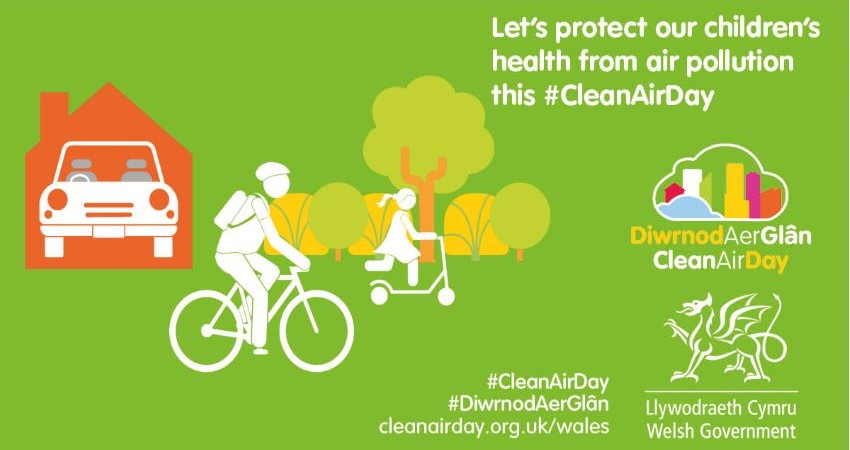
Save the date! Global Action Plan’s ‘Clean Air Day 2021’ takes place on Thursday 17th June
09 June 2021This year’s theme is ‘protect our children’s health from air pollution’, following a year of children’s lives being disrupted by the COVID-19 pandemic.
What is Clean Air Day and why is it important?
Clean Air Day is the UK's largest air pollution campaign, engaging thousands of people at hundreds of events and reaching millions more through the media.
This follows the success of Clean Air Day’s 2020 campaign (postponed until October due to the Covid-19 pandemic), where people and organisations still made efforts to leave the car at home, hold knowledge sharing online events, share information and inspiration on social media and ensure that the demand for clean air was heard across the media.
However, it is still recognised by the World Health Organisation and government that air pollution is the largest environmental health risk we face today, causing up to 36,000 deaths annually in the UK. After a year that gave us a taste of what quieter streets and cleaner air can feel like, it’s important now more than ever to improve understanding about air pollution and consider what ‘clean air positive behaviours’ we can all adopt.
On Thursday 17th June, communities, schools and businesses (including ourselves!) will demonstrate their support for action on air pollution and speak out to show how much we care about building a clean air future for our children. And you can get involved too!
How does air pollution damage health?
Air pollution is an umbrella term for lots of different types of pollution in the air around us. All these pollutants can be inhaled and absorbed into your body. Different types of air pollution are caused by different things.
Poor air quality can increase the risk of some health problems and can make existing health problems worse. For adults, this includes increased risk of: cough and phlegm symptoms; getting bacterial pneumonia; high blood pressure; cardiovascular disease; and, in the long term, developing lung cancer.
In children, their smaller bodies and developing organs and immune systems can make them especially vulnerable to air pollution. It can also play a part in causing asthma for some children and exacerbating the symptoms of those who already have it. Being exposed to air pollution can also affect children’s lung development and lead to long term health issues.
How can I help protect myself, others and the environment?
Global Action Plan recommends the following ways to reduce exposure to and creation of air pollution:
- Walk, cycle, scoot rather than driving: Being stuck in traffic can expose you to lots of pollution. Polluted air from the exhaust of other vehicles can get sucked into your car, and often stays trapped there, meaning you breathe in lots of pollution. One experiment found that a car driver was exposed to twice as much pollution as a pedestrian and nine times as much as a cyclist travelling the same journey. You can use our Walking and Cycling Planners to fine your most convenient routes.
- Consider your public transport options: Across the UK, if everyone took one more bus journey a month there would be a billion fewer car journeys and we would reduce the UK’s carbon dioxide emissions by 2 million tonnes a year[1]. This means we can all play our part by considering our public transport options just once a week and help reduce the number of cars on our roads. The transport industry also has their part to play to by shifting to ultra-low emission vehicles and making it easier, cheaper and more convenient for you to use public transport.
- Try to avoid walking along the busiest roads: Air pollution concentrates around the busiest roads and getting even a short distance away from them can make a big difference. Quieter roads have been shown to reduce your exposure to pollution by 20%.
- Don't idle: If you drive, turn off your engine when your vehicle is stationary, and it is safe to do so.
- Travel electric: There are lots of ways you can travel electric. Hire an electric car or taxi and think about an electric vehicle for your next car.
What are the transport industry and Welsh Government doing?
- Earlier this year, the Welsh Government launched their ‘Llwybr Newydd- Wales Transport Strategy’ that will shape the transport strategy in Wales over the next 20 years. It recognises the need for an accessible, sustainable and efficient transport system to best meet customer needs and to reach the Welsh Government’s net zero carbon emissions target by 2050.
- Many transport operators are introducing electric vehicles and other efficiency measures on board their network to improve air quality and generate a cleaner and more sustainable transport system in Wales. This includes Cardiff Bus, Adventure Travel and Stagecoach.
- We are also encouraging our customers to consider active travel and multi-modal journey options when travelling for both leisure and work purposes. You can use our Walking and Cycling planners to plan your journeys by bike and foot, hear from our friends as Sustrans Cymru on the role of active travel during the pandemic and beyond in our guest blog article and learn all about the benefits of walking (and using public transport to make part of your journey) from our friends at Ramblers Cymru in another guest blog article.
For more information and to find out how else you can get involved, please visit the Clean Air Day website.
[1] CPT ‘A better bus network for Wales- an agenda for the next Welsh Parliament’

